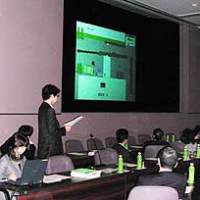Criminal hearings are open to the public, but the average person taking a seat in the public gallery would have a hard time understanding what goes on. The procedures are not only unclear, but they are also thickly clothed in legal jargon. What's more, many trials take months, or sometimes even years, before sentence is passed.
Basically, all this is because the legal system in Japan has been run solely by legal professionals.
However, in the present climate of judicial reform, the Japanese legal world is now making desperate efforts to ensure that trials become both clearer and shorter. This is primarily being done through revisions to the Criminal Procedure Law coming into effect in November as a prelude to the introduction of the saibanin (lay-judge) system in 2009.
These revisions stipulate that when the court finds it necessary, prosecutors and lawyers must meet in front of the judges prior to the opening of a District Court trial to clarify the points of argument. Then once the trial begins, it will be held almost every day, with emphasis being put on concise and clear presentations by both sides.
With these changes in the procedures, professionals expect that a typical criminal trial that now drags on for two to four months will be resolved in two to three days.
Besides the changes to pre-trial disclosure procedures, this will be achievable in large part because at present, for any trial the court typically only sits for a day every few weeks. In between, judges, prosecutors and defense attorneys may continue working on that case while being involved in others.
"The way things have run has been at the professionals' convenience, and the rights of the accused have been overlooked," said lawyer Mika Kudo, a member of the Research Office for Judicial Reform of the Japan Federation of Bar Associations.
Credibility of records
Indeed, those most closely concerned with the conduct of trials also admit that they have long been excessively detailed. "The present criminal court procedure is functioning properly, and it's not as if we have all been wasting time," said Public Prosecutor Shozo Fujita of the Supreme Public Prosecutor's Office. "But it's true that some things examined during the hearings were not relevant."
Today, criminal trials mainly focus on confirming the contents of written records of interrogations by police and prosecutors (chosho). As these interrogations take place behind closed doors, with neither audio- nor video-tape recordings being made, any argument about the credibility of these written records -- often confessions -- tends to take up a great deal of court time.
However, with the introduction of the new system, when saibanin will sit on the bench with professional judges, far more prominence is likely to be given to oral testimony at the expense of document-based submissions.
Although there are presently no plans to change the method of "secret" interrogations -- partly because prosecutors generally believe that confession is the beginning of an offender's correction -- many lawyers are now speculating that the introduction of the saibanin system may act as a spur to an ongoing revision of criminal justice procedures in Japan.
For the time being, there is plenty to wrestle with to get the saibanin system up and running smoothly within just over four years.
Mock trials
To that end, the Supreme Public Prosecutor's Office, the Japan Federation of Bar Associations and the Supreme Court held two mock saibanin system trials last year in Tokyo, while others have been staged elsewhere nationwide. Furthermore, the professional groups are working to iron out as many wrinkles as possible and to adjust their members' court practices accordingly.
Another key consideration for professionals is the way they speak in court.
On the one hand, in terms of diction and presentation, the three judicial groups are each planning lectures and training sessions led by media announcers for their members to attend. Additionally, judges will also be given tuition in how to communicate with their citizen counterparts since, as Judge Masahiro Hieda of the Criminal Affairs Bureau of the Supreme Court put it: "Professional judges will have to make effort to create an environment in which everyone feels comfortable to voice their opinions freely."
On the other hand, when the saibanin system comes in, there won't be much point speaking clearly in a language only fellow professionals can understand.
As Japanese legalese is notoriously impenetrable for the average citizen, the Japan Federation of Bar Associations has formed a group of lawyers, linguists and socio-psychologists who are working to "translate" technical terms into plain language. Late last month, the federation also held a major video seminar on the new pre-trial procedures and the saibanin system, with its Tokyo presentation beamed by satellite to some 1,700 lawyers in bar associations nationwide.
For their part, prosecutors are rehearsing the pre-trial procedure, and looking into the use of presentation software, such as Powerpoint, to make their arguments easier to understand.
"This is the first time that the Criminal Procedure Law has been revised. It's a grand reform," said Public Prosecutor Morihiro Honda, who took part in designing the saibanin system. "But the attitudes of all those in the legal circle must change in order to run the new system efficiently."


















With your current subscription plan you can comment on stories. However, before writing your first comment, please create a display name in the Profile section of your subscriber account page.